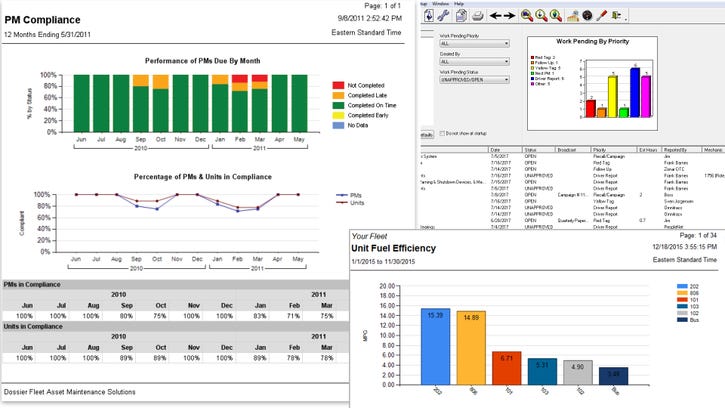The demanding nature of the waste and recycling business has driven many companies to leverage technology to better optimize their fleets.

The combination of complex trucks, high maintenance demands and multiple lines of business makes the needs of a waste hauling company more intensive than many fleets. That is why some companies have turned to technology to help manage and track their fleets.
While fleet management technology or software is not new, it has taken some time for the waste and recycling industry to pick up on certain offerings in the field. Adoption is just starting to ramp up on things like telematics inspection integration with maintenance software and dashboarding, according to Jack Boetefuer, CEO of Dossier Systems.
“Many benefits include meter updates, automatic creation of work request items based on diagnostic trouble codes or inspection failures, elimination of double data entry and associated errors and more,” says Boetefuer. “Again, not new, but SaaS [software as a service] and cloud services are picking up momentum. Many customers do not want the cost and upkeep of their own servers and IT infrastructure, especially if they need to host private cloud or webservers. Using a hosted product eliminates many of these issues, and using a partner’s cloud services gives you access to your software anywhere.”
Dossier Systems is a Burlington, N.J.-based company that offers Essentials and Professional editions of its product. Both are available as a hosted environment called Dossier On-Demand. The Professional Edition also is available on premise for the fleet's back office. Dossier is a multilayer, multitier application. The product leverages various Microsoft technologies, and the database is SQL Server.

“We empower executive management, fleet managers and line staff to capture, measure and analyze the dynamics of their fleet maintenance and operating costs,” says Boetefuer. “Dossier provides the advanced reporting and decision support tools needed to deliver real results.”
Charles Zinkowski, director of communications for Rubicon Global based in Atlanta, says the company’s products and solutions help with fleet optimization, which includes drivers logging into routes, helps reduce “missed” work, reduces idle time, among other key areas.
“We have always remained focused on developing cutting-edge technology products that bring transparency to the waste and recycling industry, encourage our customers to make data-driven decisions that lead to more efficient and effective operations and drive more sustainable outcomes,” says Zinkowski.
RUBICONConnect is Rubicon’s customer application suite of solutions. The solutions consist of a web-based portal, application and RUBICONFlash—an application that analyzes photos of bin trash to help business owners understand the savings that can be made by diverting waste away from landfills.
![]()
“Rubicon develops and deploys a full suite of cloud-based solutions to help its customers and network of independent waste haulers work toward more sustainable waste and recycling practices, uncover cost savings and improve operations through data analytics,” states Zinkowski.
Fleet management software is essential to any solid waste collection operation, comments Boetefuer.
“Waste collection equipment is as maintenance intensive as it gets, plus it tends to have a long lifecycle. Trying to operate such a fleet without a good fleet maintenance system is the equivalent of flying blind,” he says. “Be sure to choose fleet maintenance software that can handle the large number of work orders typical of a waste fleet, and one that has advanced data collection with extensive reporting to give you the business analysis that you need.”
Zinkowski says the key benefits to fleet management software are fleet optimization and reducing missed work.
“Monetary savings from more efficient routes for fixed-route vehicles can be significant. More efficient routes reduce wear and tear, greenhouse gas emissions and fuel use,” he says. “The goal is to reduce the extra work created by ‘missed’ pickups reported by citizens.�”
About the Author(s)
You May Also Like


